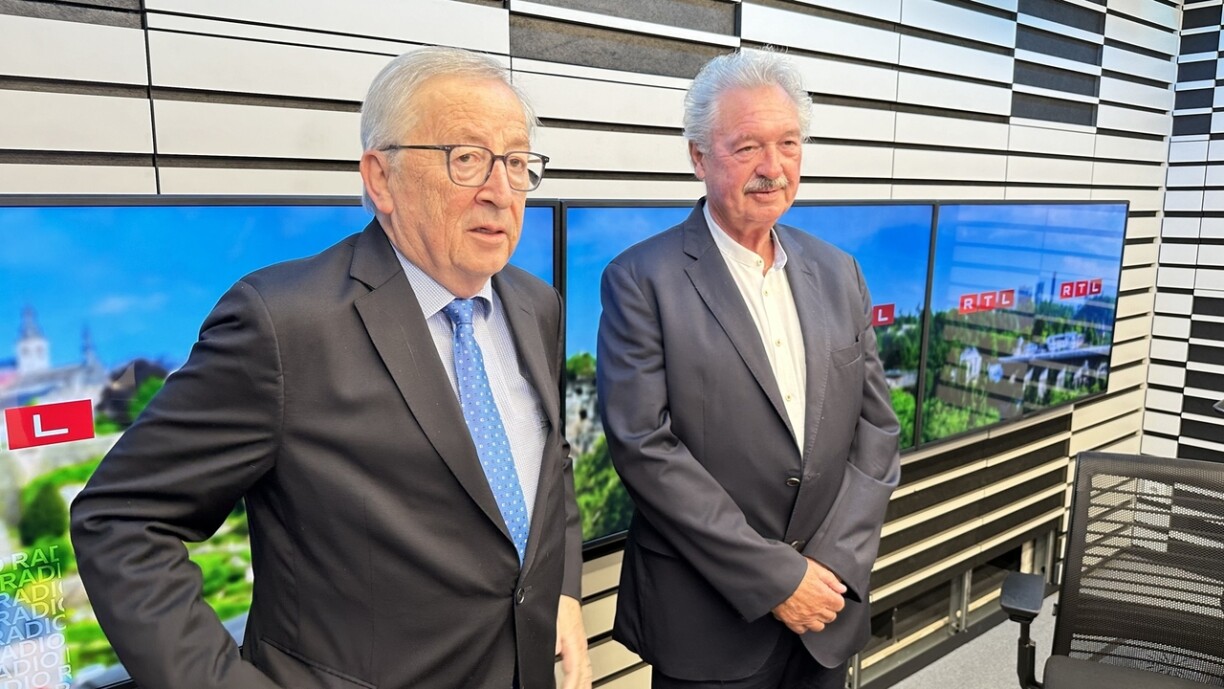
The rise of the right is not confined to France but is evident across many countries in Europe and beyond, said Jean-Claude Juncker.
The former Prime Minister of the Christian Social People’s Party (CSV) and President of the European Commission made this statement during an interview with our colleagues from RTL Radio on Saturday afternoon. Juncker, alongside former Minister for Foreign Affairs Jean Asselborn of the Luxembourg Socialist Workers’ Party (LSAP), discussed the current political climate a day before the second round of legislative elections in France.
Asselborn anticipates difficulties in forming a government in France if the far-right narrowly misses an absolute majority. “It seems like it will be chaos,” he said, adding that such a scenario would be detrimental not only for France but for all of Europe. Neither Asselborn nor Juncker made definitive predictions about the potential outcomes of the elections or how the political situation in France might evolve.
Juncker dismissed the French far-right’s new name and diluted manifesto as mere “lip service,” describing them as another label for a policy that remains concerning. Asselborn echoed these sentiments, stating that the party of Jordan Bardella and Marine Le Pen aims to “destroy Europe.” He warned that if the Franco-German partnership falters, the entire European Union, in its current form, would cease to exist.
Domestically, Asselborn noted that Emmanuel Macron must acknowledge that he cannot continue to govern as he has for the past seven years. Without government support, the French President would lose the ability to effectively represent France, he argued.
Jean-Claude Juncker attributes the significant surge in support for far-right parties to the fact that people no longer understand what it means when far-right ideologies prevail. He argued that many traditional parties now sound similar to radicals and do not strongly oppose them, creating confusion among voters. “There is no point in chasing after the far-right, for example, in migration issues,” Asselborn stressed.
Asselborn added that resistance to far-right movements cannot be left solely to politicians; it must also come from society. He noted that, particularly in France, certain sections of the press have contributed to the success of the National Rally (RN).
Juncker stressed that traditional parties are not solely to blame for the rise of the far-right. While they are partly responsible, the people themselves also bear responsibility. “No one has forced voters to adopt far-right ideologies,” he said. Juncker urged citizens to reflect on the potential consequences if the far-right comes to power, asking, “What will become of Europe? And what will happen to the individual voters who supported them?”
Both Juncker and Asselborn lamented the lack of substantive debate in France ahead of the second round of elections. They noted that discussions focused primarily on preventing Jordan Bardella from becoming Prime Minister, without addressing concrete political ideas.
Asselborn criticised President Macron’s repressive approach to pension reforms, suggesting it played into the RN’s hands. He also highlighted Macron’s mistake in categorising both the left and the RN as extremists, stating, “Macron should never have done that.” While Asselborn admitted he is “no friend” of Jean-Luc Mélenchon, the leader and founder of France’s largest leftist party La France Insoumise (“France Unbowed”), he acknowledged that the alliance of the left in the form of the Nouveau Front Populaire (“New Popular Front”) was the only viable response in the current political context.
Focusing on Europe, Jean Asselborn emphasised that the far-right aims to destroy European values and prioritise only their national interests. He warned that peace would no longer be guaranteed if European values are undermined. Asselborn analysed that if France were to get a far-right government, it could form a blocking minority at the Council level alongside Italy, the Netherlands, Hungary, and Slovakia. “At that point, Europe is blocked,” Asselborn said, adding that Europe would risk becoming ungovernable.
Jean-Claude Juncker observed that traditional parties must educate young people on the potential changes if the far-right gains power. He suggested that people need to consider whether they want permanent border controls, the abolition of the Euro, or the end of opportunities to study abroad. Juncker also noted that even Luxembourg could see a rise in far-right movements. If right-wing populists in Luxembourg found a lead candidate who appealed to the public, they could quickly surpass 10% support, he reckoned. To counter extremists, Juncker stressed the importance of identifying problems clearly and tackling them with strong arguments.
Asselborn pointed to Italy as an example of what happens when far-right radicals govern, citing the sidelining of a critical journalist by the government. Giorgia Meloni clearly has two faces, which is “extremely dangerous,” according to Asselborn.
In the first week of Hungary’s Council presidency, controversial Prime Minister Viktor Orbán embarrassed the European Union with a visit to Vladimir Putin in Moscow yesterday—a taboo breach in the midst of a war. The controversial politician and Russia sympathiser claims to be on a peace mission, but his actions are “very bad,” said Jean Asselborn.
Asselborn criticised Orbán for giving the impression that the “President of the European Union” is in Russia, which he believes is toxic for EU cohesion. He argued that Orbán has been allowed to act unchecked for too long. It now reaches a point where Viktor Orbán has become “a submarine of the Chinese and the Russians,” as Asselborn describes it.
The European Union must finally defend the rule of law effectively, Asselborn stressed. “If we carry this on for another ten years, I don’t know what Europe will look like afterward,” he warned, expressing concern that the “Orbánists” could become the majority.
Both politicians expressed concern over a potential return of Donald Trump to the White House. Jean-Claude Juncker emphasised that the resilience of US civil society should not be underestimated. He argued that if Trump is re-elected, it would be Europe’s hour to prove itself. Juncker warned that if Europe does not stand together as a bloc, Trumpism could end up dominating the entire world.